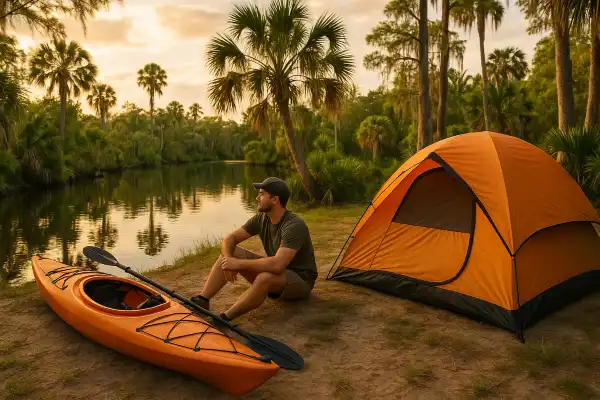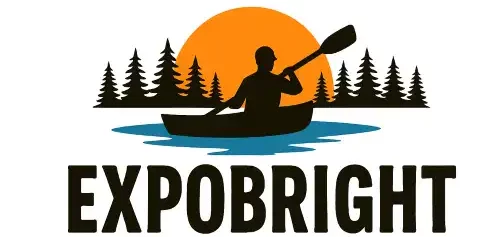Where can you kayak camp in Florida? Every winter, I get this question more than any other from paddlers looking to escape colder climates. The Sunshine State offers an incredible diversity of overnight paddling experiences, from mangrove-lined backcountry islands to crystal-clear spring runs.
After my first overnight trip through Florida’s Ten Thousand Islands two decades ago, I realized this state holds some of North America’s most accessible yet wild kayak camping destinations. Unlike the remote wilderness areas of the North, Florida’s waterways let you experience true solitude while staying within reasonable distance of civilization.
Must read for your safety when kayak camping: How to get rid of spider in a kayak?
Where can you kayak camp in Florida?
Florida offers kayak campers access to 48 designated backcountry sites in Everglades National Park alone, plus dozens more locations throughout the state ranging from elevated wooden platforms called chickees to pristine beach sites and riverside camps. The state has developed specialized camping infrastructure specifically for paddlers, including the Suwannee River Wilderness Trail with its five screened camping platforms featuring electrical outlets, hot showers, and ceiling fans.

Everglades National Park: The crown jewel of Florida kayak camping
Everglades National Park provides 46 backcountry campsites accessible only by boat, with capacities ranging from 6 to 60 people depending on the site type. The park offers three distinct camping experiences that showcase Florida’s diverse ecosystems.
Chickees: Platforms over water Chickees are wooden platforms built over water, typically 10 by 12 feet in size, designed for camping where no dry land exists among the thick mangrove islands. These elevated platforms usually have roofs and portable toilets, providing a serene place to set up a tent or hang a hammock for the night. Popular chickee locations include North Nest Key, Little Rabbit Key, and Johnson Key, which can be accessed from the Florida Keys and reserved by telephone the day before your trip.
Ground sites along rivers and bays Ground sites are located along the banks of rivers, bays, and mangrove-covered islands, with some featuring docks for landing while others require beaching your boat and dragging it out of the water. These sites typically accommodate 6 to 12 people and may or may not include portable toilets.
Beach sites on barrier islands Beach campsites are found on outlying islands in the Gulf of Mexico and can hold as many as 60 people. The best beach sites are typically on the windward sides of islands, which tend to have better beaches and fewer bugs.
Backcountry camping permits can be reserved at Recreation.gov up to three months in advance, or obtained first-come, first-served at the Flamingo or Gulf Coast Visitor Centers up to one day before your trip.
Ten Thousand Islands: Two distinct camping opportunities
The Ten Thousand Islands region offers camping in both Everglades National Park and the adjacent National Wildlife Refuge, each with different regulations and experiences.
Ten Thousand Islands National Wildlife Refuge Camping is allowed on the outer barrier islands of the Wildlife Refuge from October through April, with no permits or reservations required. Popular islands include Panther Key, Tiger Key, and Picnic Key, accessible from launch points in Everglades City. Panther Key offers excellent beach camping with no permit requirements and can be reached via the Faka Union Canal from Port of the Islands.
Ten Thousand Islands in Everglades National Park Within the national park boundaries, Tiger Key and Picnic Key offer limited beach camping sites that must be reserved at the Gulf Coast Visitor Center no more than 24 hours in advance. Tiger Key features a sheltered crescent-shaped beach on the leeward side facing West Pass, while Picnic Key’s beach sites are more exposed on the windward side.
Suwannee River Wilderness Trail: Luxury camping for paddlers
The Suwannee River Wilderness Trail spans 170 river miles from Stephen Foster Folk Culture Center State Park to the Gulf of Mexico, featuring five river camps accessible exclusively to canoeists and kayakers. These camps—Woods Ferry, Holton Creek, Dowling Park, Peacock Slough, and Adams Tract—offer free camping with screened platforms that include ceiling fans, electrical outlets, restrooms with hot showers, and picnic pavilions with charcoal grills.
To reserve sites at any of the river camps, call 800-868-9914, though the camps rarely fill up and traditional campgrounds at each site are also available if platforms are full. As of December 2024, Holton Creek and Dowling Park River Camps remained closed due to Hurricane Debby damage.
Florida Keys: Backcountry chickees and beach camping
The Florida Keys offer access to several backcountry camping sites including North Nest Key, Little Rabbit Key, and Johnson Key, plus chickee platforms like Shark Point Chickee and Johnson Key Chickee. Backcountry campers starting from the Florida Keys and staying at these sites must call the Flamingo Visitor Center at (239) 695-2945 within 24 hours of departure if they didn’t make advance reservations.
North Nest Key provides excellent access to Florida Bay’s vast shallow waters, while Short Key in Barnes Sound offers an unofficial free campsite about 14 miles northeast, popular with Keys residents especially on weekends.
State parks with kayak camping access
Silver River State Park Paddlers can enjoy the Silver River in sections or the entire 5.4 miles via launching points at the headwaters near the main spring or at the end of the River Trail. The park offers traditional camping facilities with easy kayak access.
Collier-Seminole State Park This park provides excellent boat access for kayaks and canoes up to 24 feet, with access to the Blackwater River that meanders through mangroves to Blackwater Bay and the Ten Thousand Islands. The park includes canoe and kayak rentals along with a boat ramp providing access to the Blackwater River.
Anastasia State Park Located in St. Augustine, the park offers miles of pristine beach, tidal salt marsh and upland hammocks to explore by kayak. Traditional camping facilities are available within the park.
Grayton Beach State Park Kayakers can explore the salt marsh ecosystem on scenic Western Lake in this nearly 2,000-acre park. The park offers access to explore the backwaters of Western Lake, a 100-acre coastal dune lake brimming with plant and animal life.
Spring-fed rivers and camping options
Florida’s spring runs provide year-round clear water and comfortable camping temperatures, with several options for kayak campers.
Stephen Foster Folk Culture Center State Park offers cabins and camping on the Suwannee River, while Fanning Springs State Park provides cabins and primitive camping. Lafayette Blue Springs State Park in Mayo has cabins and tent camping, and Manatee Springs State Park in Chiefland offers camping facilities.
The Ocklawaha and Silver Rivers near Ocala provide excellent paddling with camping available at Gores Landing for $10 per night, including primitive facilities with bathrooms but no showers.
Conclusion
In 2021, I guided a family through their first Florida Bay chickee experience at Johnson Key. Watching their amazement as dolphins surfaced beside our kayaks at sunset reminded me why I launched Expobright—to help paddlers discover these incredible experiences with confidence. Following detailed guidance and understanding the unique camping options Florida offers can transform an ordinary weekend into an unforgettable adventure that connects you deeply with some of America’s most pristine waters.
Follow Expobright for exclusive kayak and canoe camping tips.
